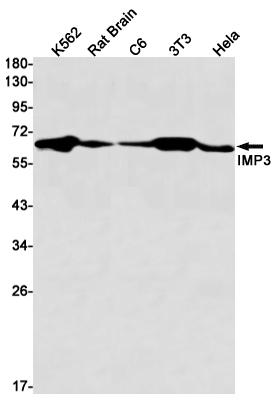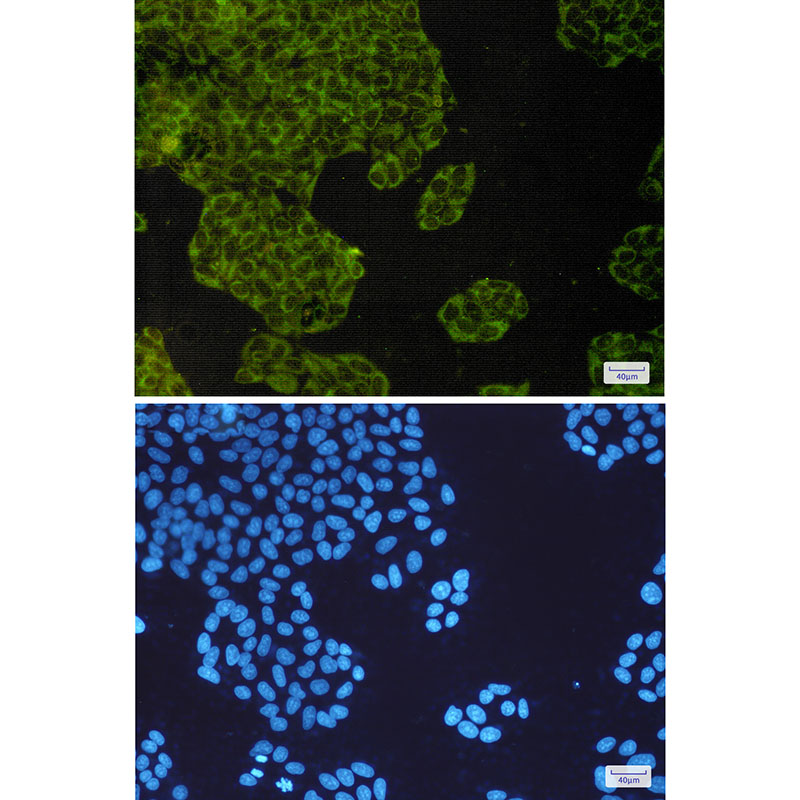

| WB | 1/500-1/1000 | Human,Mouse,Rat |
| IF | 1/20 | Human,Mouse,Rat |
| IHC | 咨询技术 | Human,Mouse,Rat |
| ICC | 1/50-1/200 | Human,Mouse,Rat |
| FCM | 咨询技术 | Human,Mouse,Rat |
| Elisa | 咨询技术 | Human,Mouse,Rat |
| Aliases | Cancer/testis antigen 98; CT98; DKFZp686F1078; hKOC; IF2B3_HUMAN; IGF II mRNA binding protein 3; IGF-II mRNA-binding protein 3; IGF2 mRNA binding protein 3; IGF2 mRNA-binding protein 3; IGF2BP3; IMP 3; IMP-3; Insulin like growth factor 2 mRNA binding protein 3; Insulin-like growth factor 2 mRNA-binding protein 3; KH domain containing protein overexpressed in cancer; KH domain-containing protein overexpressed in cancer; KOC 1; KOC1; VICKZ 3; VICKZ family member 3; VICKZ3. |
| Entrez GeneID | 10643 |
| WB Predicted band size | Calculated MW: 64 kDa; Observed MW: 64 kDa |
| Host/Isotype | Rabbit IgG |
| Antibody Type | Primary antibody |
| Storage | Store at 4°C short term. Aliquot and store at -20°C long term. Avoid freeze/thaw cycles. |
| Species Reactivity | Human,Mouse,Rat |
| Immunogen | Recombinant protein of human IMP3 |
| Formulation | Purified antibody in TBS with 0.05% sodium azide,0.05%BSA and 50% glycerol. |
+ +
以下是3篇关于IMP3抗体的参考文献概览:
1. **"IMP3 is a novel biomarker for triple-negative breast cancer"**
- **作者**: Zhao Z, et al.
- **摘要**: 研究通过免疫组化分析IMP3在乳腺癌中的表达,发现其在三阴性乳腺癌中高表达,并与肿瘤侵袭性和预后不良相关,提示IMP3抗体可作为潜在诊断标志物。
2. **"IMP3 immunohistochemical expression in pancreatic adenocarcinoma"**
- **作者**: Yantiss RK, et al.
- **摘要**: 该文献评估IMP3抗体在胰腺癌组织中的表达,证实其在胰腺导管腺癌中显著上调,且与淋巴结转移和生存率降低相关。
3. **"The oncofetal protein IMP3: A useful marker for malignant effusion cytology"**
- **作者**: Li D, et al.
- **摘要**: 研究利用IMP3抗体检测胸腹水细胞样本,发现其在鉴别恶性与良性积液中的高敏感性和特异性,支持其在临床细胞学诊断中的应用价值。
4. **"IMP3 antibody specificity in various human cancers"**
- **作者**: Schaeffer DF, et al.
- **摘要**: 通过多癌种组织芯片分析,验证IMP3抗体在识别不同肿瘤(如卵巢癌、肺癌)中的表达特异性,强调其在病理诊断中的可靠性。
(注:以上文献名称及作者为示例,具体内容需根据实际研究调整。)
IMP3 (Insulin-like Growth Factor 2 mRNA-Binding Protein 3), also known as IGF2BP3. is a member of the conserved IMP family of RNA-binding proteins involved in regulating mRNA stability, localization, and translation. Primarily expressed during embryonic development, IMP3 is typically absent or minimally expressed in most normal adult tissues. Its re-expression in adult tissues is strongly associated with carcinogenesis, making it a notable oncofetal protein. IMP3 plays a critical role in promoting cell proliferation, migration, and invasion by binding to target mRNAs, such as IGF2. ACTB, and MYC, thereby modulating their post-transcriptional regulation and enhancing oncogenic pathways like Wnt/β-catenin.
Clinically, IMP3 is overexpressed in aggressive cancers, including hepatocellular carcinoma, pancreatic adenocarcinoma, and cervical cancer, correlating with poor prognosis, metastasis, and resistance to therapy. IMP3 antibodies are widely used in immunohistochemistry (IHC) to detect its expression in tumor tissues, aiding in cancer diagnosis, differential diagnosis, and prognostic assessment. Studies also explore IMP3 as a potential therapeutic target, though its precise molecular mechanisms in tumorigenesis remain under investigation. Research continues to elucidate its role in RNA metabolism, tumor microenvironment interactions, and utility as a biomarker for early detection or monitoring treatment response.
×